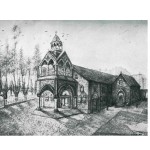The news stories have been unrelenting and painful: refugees from Syria, Afghanistan, Iraq, Kosovo, Albania, Pakistan, Eritrea, Nigeria, Iran, Ukraine, Somalia, Sudan. Fleeing war, turmoil, violence at home, needing assistance from others, their numbers overwhelming facilities at the places they have landed.
Their personal stories overflow with loss. It is wrenching to hear them. And easier for us that few such refugees are here in the United States, where more help might be expected.
We may know what to do when someone in our own family is displaced, bereaved or suffers some other significant loss. When it’s a dear friend or neighbor, we give aid and comfort as best we can. Our role in these situations is natural, clear, expected. Similarly for a stricken person’s church, pastor, rabbi or imam: a familiar task within a community.
What to do, though, when some unknown child or adult or family knocks on our kitchen door, begging food, needing a place to stay? What if some disaster — storm or war, flood or accident – has upended their normal lives and left these strangers destitute and displaced from their community?
Your response will probably depend on where else you think the strangers might find help. Is there a homeless shelter, a soup kitchen, a municipal center nearby that would give assistance? But if there are no such resources, how will you respond to the pleading on your doorstep?
All over the world, in old times and modern, beggars beseech strangers for food and money. Many cities today have programs to help them: food, shelter, blankets, clothing, and sometimes, work. This is not true for every city even in developed countries including the United States. Instead, religious communities may fill the need to some degree, and very well in some instances — always depending on members of the faith to provide money and time for this assistance.
And so it was for Marjan, her family and many other Armenian Christians living in eastern Turkey in 1895-1896 during the hamidieh massacres (named for Sultan Abdul Hamid II). Erzerum’s ecclesiastical leader, Bishop Shishmanian, directed the congregation to help the refugees clamoring at the doors of Saint Asdvadzadzin Armenian Apostolic Church and they responded generously. When widow Sharopyan took some dozen refugees into the unused rooms of her large house, Marjan and many other church members went to cook, sew and care for them. Others donated food, bedding, clothing and fuel.
There was little question of the Kavafian family taking in a young refugee and his sister, newly orphaned in Trabizond’s violence a few weeks earlier — they were related by a marriage some time back. The orphans’ transition was made easier by similar upbringing.
A greater test of charity came when the Kavafians provided a young peasant family with shelter in the stable near the kitchen. The Kavafians not only fed and clothed them, but Marjan and her sister-in-law worked at helping them adapt to changes that nearly overwhelmed them. When the young family needed another place to live, Marjan and her sister-in-law found a welcoming home for these three young peasants.
Later developments brought bereavement and fear of violence directly into their household. The Kavafians sustained one another, continued to care for “their” refugees and were in return helped by the refugees and the process of caring for them.
Neighbor relationships emerge as crucial in the basic drama at the novel’s heart. It was their Muslim neighbors who made sure the Christian family was safe during the violence in Erzerum, and ultimately, it was these neighbors’ efforts which reunited the family of Marjan’s friend.
Through its stories, Prelude to Genocide: Incident in Erzerum illustrates the compelling importance of the relationships among neighbors, communities and families in helping individuals survive and overcome the violence and anxiety that occur in times of upheaval.

Leave a Comment